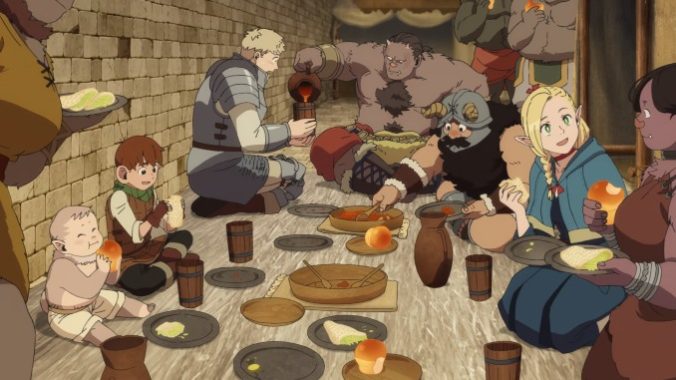Netflix’s Cooking Anime Delicious in Dungeon Is Filling Thanks to Its Fresh Takes on Fantasy
Photo Courtesy of Netflix
As a genre, fantasy can be almost anything. However, “anything” is quite intimidating, and for many reasons (including common points of inspiration and commercial pressures) that limitless field of possibilities frequently dwindles to a handful of digestible templates. Thanks to the influence of Tolkien, Dungeons and Dragons, and other works that plucked elements from these and earlier tales, a whole field of tropes have codified around high fantasy, from their backdrops to the specific peoples that inhabit these spaces.
In the realm of anime, these influences often feel even more focused, with many of them traditionally drawing on ‘80s role-playing videogames like Wizardry and its numerous clones and, in recent years, frequently parroting popular “LitRPGs” such as Sword Art Online, where characters are either in a fantasy videogame or in settings that non-critically use the verbiage of games, even if this doesn’t actually make much sense in context. Unfortunately, this has led to a crop of copy-cats that are less interested in fleshing out unique places and more interested in reveling in how cool the protagonist’s “game-breaking” ability is or whatever.
But despite what’s in vogue, there will always be stories that do cool things within seemingly restrictive genre spaces. This most recent season has seen multiple, from Frieren: Beyond Journey’s End’s melancholic musings to the over-the-top gags of ‘Tis Time for Torture Princess. And somewhere between the globe-spanning trek of the former and cozy times of the latter is Delicious in Dungeon, a food-obsessed adventure that finds new takes on familiar material.
The premise is as follows: after a trek into a dungeon ends in disaster, a party consisting of the tall-man (aka human) swordfighter Laios, elven mage Marcille, and halfling locksmith Chilchuck must plunge back into its depths to save their companion Falin, who was swallowed whole by a red dragon. The group is eager to rush back and rescue her before she’s digested, but unfortunately, they’re out of coin for food provisions.
Taking this situation as an opportunity to satisfy a life-long curiosity about monster meat, Laios suggests that they cook up some dungeon critters, which Chilchuck and especially Marcille are not exactly thrilled about. Luckily, they bump into Senshi, a dwarf who’s been studying how to serve up these subterranean creatures for the last decade, and who is so eager to share his findings that he joins the crew. In a race against time, they retread their steps back into this labyrinth, snacking on creatures as they make their way to the lower levels where the dragon lurks.
If it wasn’t clear from the setup, this series is very much about cooking. Almost every episode focuses on at least one lavishly prepared dish, most of which are the namesake of that week’s adventure. While it isn’t the first fantasy anime to emphasize crafting meals (some other examples are Restaurant to Another World or Isekai Izakaya), and it’s not the first action series to be about hunting game in the pursuit of dining, this particular mashup still mostly feels novel.
And more than this being a relatively fresh spread, where the series’ food-based hijinks truly shine are in their execution. We watch as Senshi slices and dices murderous plants, sautés Walking Mushrooms, and roasts Basilisks, as knifework and other precise motions are lovingly rendered via fluid character animation that lets us soak in all the little details. Ingredients char and boil to mouthwatering effect, and when the recipes are finally completed, hyper-detailed stills with the dish name are displayed alongside a triumphant trumpet blast. It’s dang satisfying.
But perhaps the biggest payoffs come after our adventurers finally dig in, hesitation turning to joy as they (usually) find flavorful bliss in each bite, which comes across thanks to their expressively rendered reactions and delighted exclamations. Studio Trigger, who are mostly known for their madcap action series like Kill la Kill, put an equal amount of care into animating this particular brand of food voyeurism, and the results are delectable.
Additionally, as Senshi carries out his craft, he explains the specifics of each recipe as if he’s on the Food Network, making it clear that the lore-dumping tendencies of high fantasy match up perfectly with the similarly tidbit-dense format of cooking programs. While I’ll probably never prepare dried Slimes, listening to our head chef explain the underlying principles of his trade is downright therapeutic thanks to how closely it groks to concocting actual meals.
But focusing on food isn’t the only way the series distinguishes itself from much of its ilk. One of the most talked about and contentious aspects of many fantasy stories is how they depict different “races,” such as humans, orcs, elves, and more. It’s a topic that has spawned a lot of discourse, from insufferable forum threads to bona fide academic research. To avoid a lengthy tangent, I’ll simplify my stance: this is frequently my least favorite trope in the genre when handled poorly because, most charitably interpreted, it can set up uninteresting circumstances where entire groups of people act a certain way, and at worst, it can have troubling parallels to real-life stereotyping. If nothing else, it is very, very boring when certain groups (traditionally orcs) are portrayed as one-sidedly evil, as it washes away any moral compunctions for our protagonists to cut them down and minimizes the need for tricky things like complicated belief systems.
While the way these different peoples are portrayed is a background element in Delicious in Dungeon, at least through the first 11 episodes currently out, the series has handled it relatively well. The members of our adventuring crew are a diverse bunch, and their quirks are never tidily explained by their “race.” For instance, Laios acting like a little freak who wants to eat monsters has nothing to do with being a tall-man, and Senshi is more interested in cooking than “traditional dwarf things,” such as blacksmithing and mining.